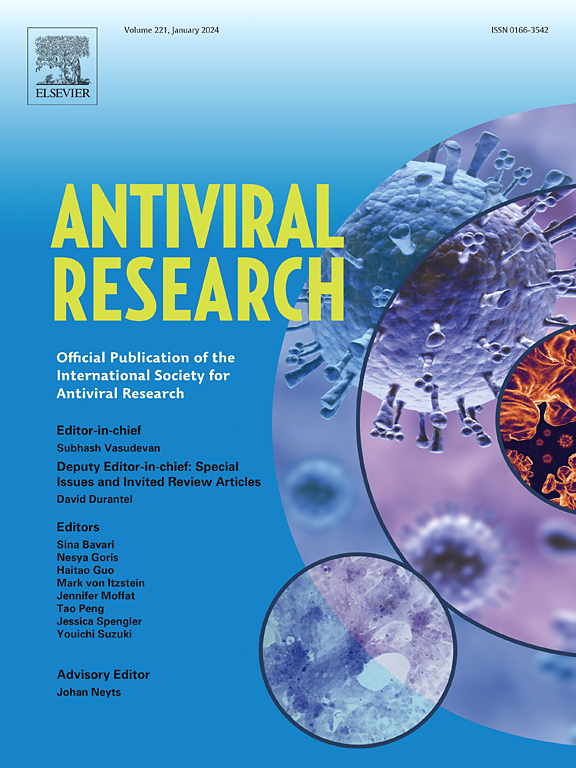在临床相关的人巨细胞病毒毒株中产生对标准护理疗法耐药的一组突变体,以进行耐药性分析
IF 4.5
2区 医学
Q1 PHARMACOLOGY & PHARMACY
引用次数: 0
摘要
人巨细胞病毒(HCMV)感染可导致免疫抑制和免疫功能低下患者群体的重大疾病负担。目前的护理标准(SOC)依赖于直接作用的抗病毒药物,这些药物靶向有限的病毒蛋白,包括病毒聚合酶(UL54)、终止酶(UL56)和蛋白激酶(UL97)。病毒编码蛋白的不完全抑制导致产生“突破性”耐药变异的选择性压力。评估新型抗病毒药物的一个限制是很难分析它们对当前SOC干预的抗性变异的抗病毒活性,因为这些抗性变异出现在不同的遗传背景下,具有不同的复制动力学和产量。为了限制菌株变异,我们在细菌人工染色体(BAC)衍生的HCMV临床相关实验室菌株TB40e中生成了一个靶向突变病毒组,该病毒在病毒进入时表达荧光蛋白mCherry,在病毒DNA复制后有时表达eGFP。这种独特的结构允许独立监测病毒进入和病毒DNA复制。该小组由WT和7个突变病毒组成,这些突变病毒具有对更昔洛韦、马里巴韦、西多福韦和莱特莫韦产生耐药性的突变。此外,我们还鉴定了一种宿主靶向Sirt2去乙酰化酶(Sirt2)抑制剂FLS-359,用于抗SOC耐药变体。我们观察到突变病毒对SOC抑制的EC50浓度增加,宿主定向的FLS-359对已知的SOC耐药突变体表现出广谱抗病毒活性。该小组代表了一个急需的相对创新的平台,用于筛选新的直接作用抗病毒药物和宿主靶向抗病毒药物对治疗干预的HCMV变异的疗效。本文章由计算机程序翻译,如有差异,请以英文原文为准。
Generation of a panel of mutants that are resistant to standard of care therapies in a clinically relevant strain of human cytomegalovirus for drug resistance profiling
Infection with human cytomegalovirus (HCMV) can result in a significant disease burden within the immunosuppressed and immunocompromised patient populations. Current standard of care (SOC) relies on direct-acting antivirals which target a limited group of viral proteins including the viral polymerase (UL54), terminase (UL56), and protein kinase (UL97). Incomplete inhibition of virally encoded proteins result in a selective pressure towards the generation of “breakthrough” drug resistant variants. One limitation in evaluating novel antivirals is the difficulty in profiling their antiviral activity against variants resistant to current SOC interventions, as these resistant variants have arisen in different genetic backgrounds with distinct replication kinetics and yields.
To limit strain variation we generated a targeted mutant panel of viruses in a bacterial artificial chromosome (BAC) derived clinically relevant laboratory strain of HCMV, TB40e, that expresses the fluorescent proteins mCherry upon viral entry and eGFP at times after viral DNA replication. This unique construct allows for the monitoring of viral entry and viral DNA replication independently. This panel consists of WT and seven mutant viruses harboring mutations that confer resistance to ganciclovir, maribavir, cidofovir, and letermovir. In addition, we characterized a host-targeted sirtuin 2 deacetylase (Sirt2) inhibitor, FLS-359, against the SOC resistant variants. We observed that mutant viruses demonstrated increased EC50 concentrations for SOC inhibition, and that host directed FLS-359 demonstrated broad-spectrum antiviral activity against known SOC drug-resistant mutants. This panel represents a much-needed comparatively innovative platform for screening the efficacy of new direct-acting antivirals and host-directed antivirals against HCMV variants refractive to therapeutic interventions.
求助全文
通过发布文献求助,成功后即可免费获取论文全文。
去求助
来源期刊

Antiviral research
医学-病毒学
CiteScore
17.10
自引率
3.90%
发文量
157
审稿时长
34 days
期刊介绍:
Antiviral Research is a journal that focuses on various aspects of controlling viral infections in both humans and animals. It is a platform for publishing research reports, short communications, review articles, and commentaries. The journal covers a wide range of topics including antiviral drugs, antibodies, and host-response modifiers. These topics encompass their synthesis, in vitro and in vivo testing, as well as mechanisms of action. Additionally, the journal also publishes studies on the development of new or improved vaccines against viral infections in humans. It delves into assessing the safety of drugs and vaccines, tracking the evolution of drug or vaccine-resistant viruses, and developing effective countermeasures. Another area of interest includes the identification and validation of new drug targets. The journal further explores laboratory animal models of viral diseases, investigates the pathogenesis of viral diseases, and examines the mechanisms by which viruses avoid host immune responses.
 求助内容:
求助内容: 应助结果提醒方式:
应助结果提醒方式:


